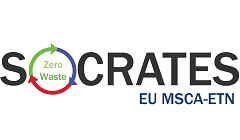Newsletters
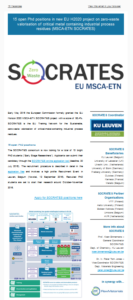 ETN SOCRATES provides regular newsletters to provide information on the project progress and on relevant events in the field of zero-waste valorisation of low-grade ores, extractive waste and industrial process residues. A first Newsletter was sent out to announce the project and call for potential ESR candidates (read Newsletter here). You can register for the SOCRATES Newsletter here: https://etn-socrates.eu/ (right column)
ETN SOCRATES provides regular newsletters to provide information on the project progress and on relevant events in the field of zero-waste valorisation of low-grade ores, extractive waste and industrial process residues. A first Newsletter was sent out to announce the project and call for potential ESR candidates (read Newsletter here). You can register for the SOCRATES Newsletter here: https://etn-socrates.eu/ (right column)
Furthermore, ETN SOCRATES is also linked to the EURELCO Network, which produces a monthly newsletter that contains info which is also very relevant for the SOCRATES community. This newsletter also provides regular Enhanced Landfill Mining (ELFM) Policy Brief sections, where the policy aspects of ELFM are investigated and where suggestions to policy makers are provided. The EURELCO Newsletters can be downloaded through: https://www.eurelco.org/newsletter. You can register for this EURELCO Newsletter here.
*
Policy Briefs
ETN SOCRATES regularly publishes Policy Briefs which are intended for EU and national Policy Makers.
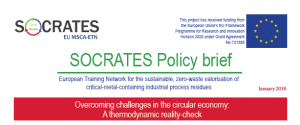 SOCRATES Policy Brief 1 (January 2018): Overcoming challenges in the circular economy
SOCRATES Policy Brief 1 (January 2018): Overcoming challenges in the circular economyIn this first EU MSCA-ETN SOCRATES Policy Brief, guest authors – Justin Salminen and Sirpa Olaussen from Boliden – provide their view on the challenges with respect to the zero-waste valorisation of low-grade ores and metal-containing industrial process residues. Salminen and Olaussen stress the importance of carefully explaining the overall impact of policy decisions and their consequences. Zero-waste may sound nice but in reality this is not straightforward to achieve: a thermodynamic reality check is vital, as is discussed in detail in this Policy Brief. Finally, Salminen and Olaussen offer a number of recommendations for policy makers in the metals and minerals sector.
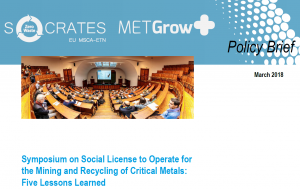 SOCRATES Policy Brief 2 (March 2018): The Social License to Operate for mining and recycling of critical metals
SOCRATES Policy Brief 2 (March 2018): The Social License to Operate for mining and recycling of critical metalsFollowing the Symposium on Transitioning to a Low-Carbon Economy – the Social License to Operate for the Mining and Recycling of Critical Metals (21 February 2018, Leuven, Belgium) the two EU Horizon 2020 projects SOCRATES and METGROW+ joined forces to publish a Policy Brief on this crucial topic for the mining/metallurgy sector in Europe and the wider society in general. The Policy Brief discusses the Five Lessons Learned with respect to the Social License to Operate for the mining and recycling of critical metals, which are essential for the transition to a low-carbon economy. An executive summary is provided below. Download SOCRATES_METGROW_PolicyBrief_SLO
*
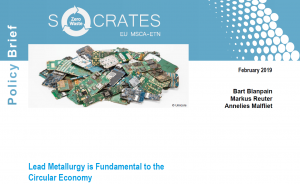 SOCRATES Policy Brief 3 (February 2019): Lead metallurgy is fundamental to the circular economy
SOCRATES Policy Brief 3 (February 2019): Lead metallurgy is fundamental to the circular economy
During the last few years, the use of lead (Pb) in the EU economy has been called into question by some policy makers. Lead is frequently seen as a problematic metal that can be detrimental to human health; what is much less well known is its fundamental role in the Circular Economy. To provide a firm metallurgical background on the importance of lead, the EU ETN SOCRATES team has just published a new Policy Brief, authored by Prof. Bart Blanpain (KU Leuven), Prof. Markus Reuter (HZDR/TU BAF) and Dr. Annelies Malfliet (KU Leuven). They argue that restricting lead metallurgy in the EU would not only have a detrimental impact on the lead industry, but also on all the industries linked to it that work with elements like Ag, Cu, Sb, Sn, Te, and Zn. In this way, our future plans for energy storage, smart cities and clean technologies in the EU might be jeopardized. Download SOCRATES Policy Brief here. Read the Press Release here.
SOCRATES Policy Brief 4 (September 2020): The EU’s metallurgical infrastructure is a cornerstone of the EU Green Deal and the Agenda 2030 realization
The realisation of the goals of the EU Green Deal and the Agenda 2030 for Sustainable Development requires a metallurgical industry that is even more resource-efficient, eco-friendly and responsible than it is today.
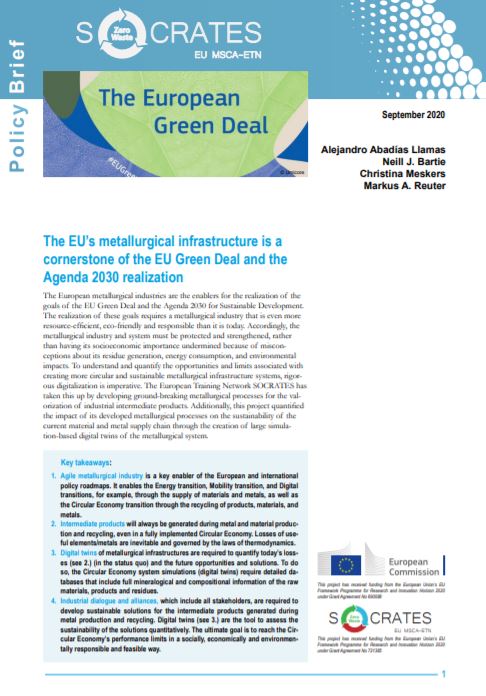
To understand and quantify the opportunities and limits associated with creating more circular and sustainable metallurgical infrastructure systems, rigorous digitalisation is imperative.
The key messages of this final ETN SOCRATES Policy Brief are:
- An agile metallurgical industry is a key enabler of the European and international policy roadmaps.
- Intermediate products will always be generated during metal and material production and recycling, even in a fully implemented Circular Economy.
- Digital twins of metallurgical infrastructures are required to quantify today’s losses (see 2.) (in the status quo) and the future opportunities and solutions.
- Industrial dialogue and alliances, which include all stakeholders, are required to develop sustainable solutions for the intermediate products generated during metal production and recycling. Digital twins (see 3.) are the tool to assess the sustainability of the solutions quantitatively.
Download SOCRATES Policy Brief here. Read the Press Release here.
